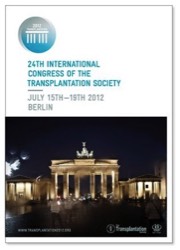Profiles of microRNA after rat partial hepatectomy

Following the exceptionally successful meetings in Boston, Sydney and Vancouver, we would like to welcome you to a city which twenty years after reunification has evolved into one of the most important capitals of Europe. Once the capital of Prussia and leading cultural centre of the 1920s, today the new capital of Germany is characterized by its dazzling modernity and breathtaking architecture. Berlin is young, dynamic and bursting with joie de vivre. Few cities has been shaped to such an extent by history and undergone as much major transformation as Berlin. “Berlin is always in the process of becoming”, remarked historian Karl Scheffler. Even in the 21st century transplantation still is in a process of becoming, too. Therefore, the 24th International Congress of The Transplantation Society will promote the dialogue of experts from around the world. An attractive scientific program will be developed together with the Deutsche Transplantationsgesellschaft (DTG).
The 24th Congress is designed for physicians, surgeons, scientists and organ procurement personnel, who are interested in clinical and research aspects of solid organ, cell and tissue transplantation. The program is developed to encourage the exchange of new scientific and clinical information, and and support an interchange of opinions regarding care and management issues, as well as socioeconomic, ethical and regulatory issues relevant to transplantation.
In addition to the classical types of scientific sessions including plenary sessions, symposia, workshops and poster presentations, we will also offer new types of scientific sessions within the Forum Futurum focusing on Tailored Pharmacotherapy, Imaging and Regenerative Medicine. All of this is designed to develop a highly interactive forum to discuss cutting-edge science in our field.
We therefore cordially invite you and your colleagues together with your friends and family to come to Berlin. Your active participation in the scientific program will be the fundament for a successful event in 2012.

